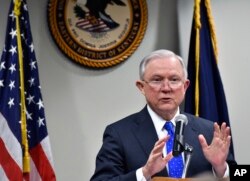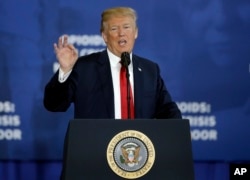U.S. Attorney General Jeff Sessions is urging federal prosecutors to seek the death penalty in some drug-related cases, including in so-called "drug kingpin" cases, endorsing a controversial idea recently proposed by President Donald Trump as part of his campaign against the nation's opioid epidemic.
In a memo sent Tuesday to 93 U.S. attorneys, Sessions wrote that "federal prosecutors must consider every lawful tool at their disposal" to combat the epidemic of opioid addiction, including the use of capital punishment, where appropriate.
"The opioid epidemic has inflicted an unprecedented toll of addiction, suffering and death on communities throughout our nation," Sessions wrote. "In the face of all of this death, we cannot continue with business as usual."
As the nation's chief law enforcement officer, Sessions has directed federal prosecutors to pursue "the most serious, readily provable offense" with the lengthiest sentences in all criminal cases. But he is not known to have advocated the death penalty for drug dealers in the past.
However, Trump, a long-time advocate of capital punishment, started pushing the idea in recent weeks. At a rally in Pennsylvania on March 10, Trump praised China and Indonesia for executing drug dealers.
"When I was in China and other places, by the way, I said, 'Mr. President, do you have a drug problem?' 'No, no, no, we do not.' I said, 'What do you attribute that to?' 'Well, the death penalty,'" Trump said.
Trump unveiled his long-awaited plan to combat the opioid crisis on Monday, calling for stiff penalties for drug traffickers, including the death penalty in some cases.
"If we don't get tough on the drug dealers, we are wasting our time. And that toughness includes the death penalty," Trump said at a rally in New Hampshire, a state hit hard by the opioid epidemic.
Trump's plan also calls on Congress to pass legislation to reduce the amount of drugs required to trigger mandatory minimum sentences for drug traffickers.
In his memo to prosecutors, Sessions cited four federal laws that call for capital punishment in certain drug-related cases, including the so-called "drug kingpin" law that authorizes the death penalty for people who deal in extremely large quantities of drugs.
"I strongly encourage prosecutors to use these statutes, (laws) when appropriate, to aid in our continuing fight against drug trafficking and the destruction it causes in our nation," Sessions said.
Federal executions are extremely rare — there have been just three since the 1960s. And prosecutors will be hard-pressed to seek the death penalty in drug cases that do not involve homicide.
While three of the statutes Sessions cited involve murder and could lead to the death penalty, the fourth — the drug kingpin law — does not, and has never, resulted in an execution, according to Ames Grawert, senior counsel at the left-leaning Brennan Center for Justice at New York University Law School.
"As far as we can see, that's only been charged twice, and in the end, in both of those cases, the defendants were sentenced to long periods of incarceration, rather than the death penalty," Grawert said.
What is more, he added, the Supreme Court has consistently ruled that "you can't constitutionally impose the death penalty for anything less than homicide."
In a 2008 case, Kennedy v. Louisiana, the Supreme Court ruled that imposing the death penalty for the rape of a child in a case that did not involve murder was unconstitutional.
The opioid epidemic has grown increasingly deadly in recent years. In 2016, there were nearly 64,000 drug overdoses in the United States, more than 42,000 caused by opioids, according to the Centers for Disease Control and Prevention.







